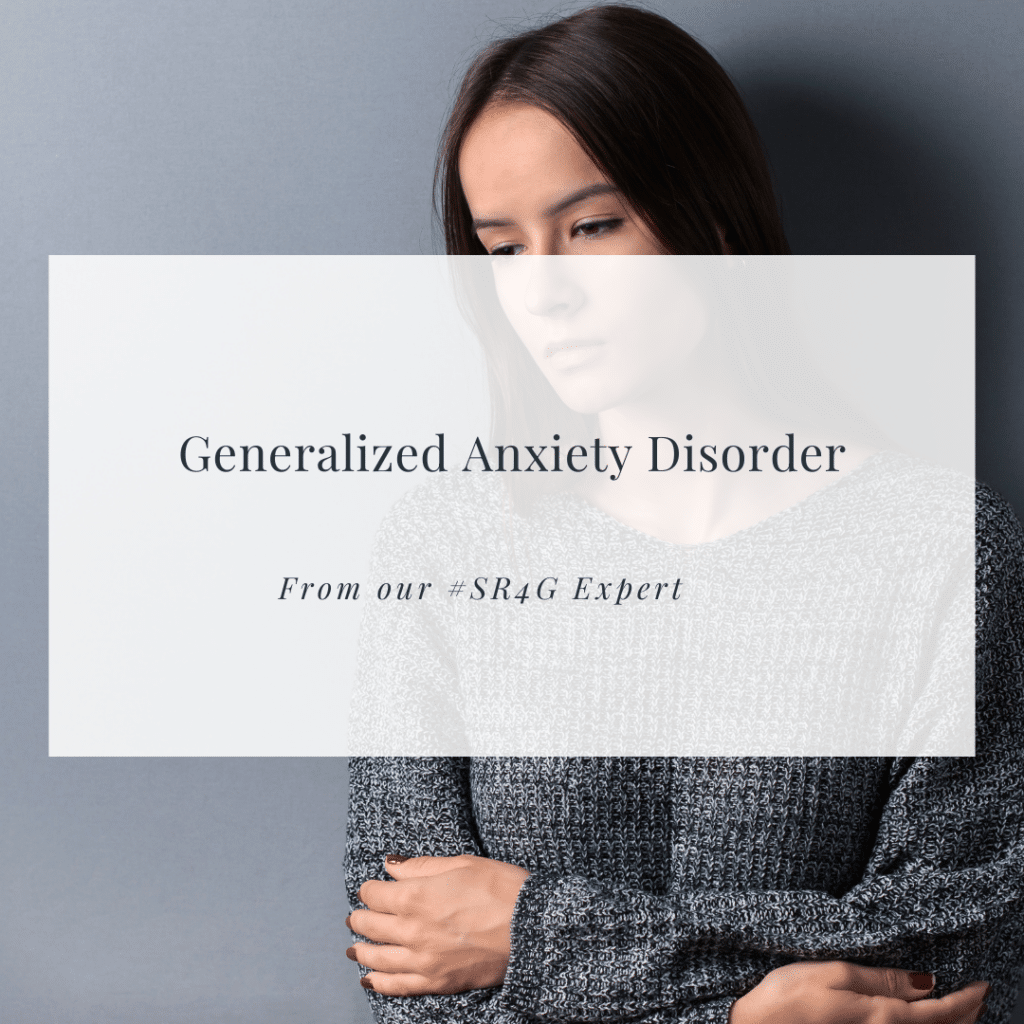
Stress is a normal part of life and stress at a manageable level can even be helpful in mobilizing a response to solve a current problem. Yet some people experience excessive amounts of stress that exceeds the individuals’ range of resilience, overwhelms the nervous system, and becomes disordered. Generalized Anxiety Disorder, or GAD, is characterized by excessive worry occurring more days than not for 6 or more months about a variety of things. GAD is one of the most common psychiatric disorders in the US, occurring in about 30% of adults at some point in the lifespan. GAD differs from normal stress in that it is excessive, it is out of proportion to the current situation given the sociopolitical context, and it impairs individuals’ ability to take care of their basic needs (eat, sleep, movement, social connection) and function in their lives across contexts (work, school, socially, etc).
Individuals with Generalized Anxiety Disorder tend to catastrophize and worry excessively about things such as work, school, money, relationships, and other things that are going on in their life. Symptoms of Generalized Anxiety Disorder also include difficulty controlling the worry, restlessness or feeling on edge, feeling easily fatigued, difficulty concentrating, the mind going blank, irritability, muscle tension, and/or sleep disturbance, all of which cause distress and impairment in functioning. All of these symptoms are byproducts of an overactive nervous system.
The human nervous system is designed for survival. When the nervous system detects a threat (perceived or real), multiple signals get sent to the body to get ready to fight, flight, or freeze in order to stay safe. This happens before we are consciously aware. For example, signals get sent to the gut to stop digestion when we perceive a threat. This can create sensations of needing to go to the bathroom immediately, feeling nauseous, and/or lack of appetite. Our blood pressure (and heart rate) increases and blood flows to our major muscle groups (away from our extremities), which can result in feeling cold, clammy hands, heart racing, and heaviness/tightness in the chest. Breathing changes from deep, slow, diaphragmatic breathing to short, shallow, chest breathing so we are taking in extra oxygen which can cause feelings of not being able to breathe/shortness of breath. Sensory information stops traveling to our frontal lobe (which is responsible for reason/logic), we become focused solely on the perceived threat, and it becomes difficult to concentrate on anything else or sleep. Muscles become tense to get ready to flight, fight, or freeze which can cause soreness, head/muscle aches, and feelings of fatigue. All of these are helpful changes in the short-term when we are in immediate danger and need to get to safety fast. The problem in GAD is these changes get activated outside of immediate danger, which is exhausting for our bodies and makes it difficult to cope with everyday stressors.
Generalized Anxiety Disorder is a treatable condition. Typically, therapy along with medications are the first line of treatment. Cognitive Behavior Therapy (CBT) is an evidence-based form of therapy that focuses on recognizing and changing ineffective thought patterns, unhelpful behaviors, and learning new skills within different contexts to better cope with difficult emotions and experiences. Exposure and Response Prevention (ERP) is an evidence-based subtype of CBT specifically aimed at helping individuals face their fears and reduce/eliminate safety/avoidance behaviors. By gradually confronting situations, thoughts, images, objects, etc that are feared without doing safety/avoidance behaviors, individuals learn that the things they fear are not harmful (it’s a false alarm), that safety/avoidance behaviors are unnecessary, that fear/anxiety does not last forever, that they can tolerate distress, and individuals gain confidence in their ability to actively participate in their life and effectively cope with stress.
Self-compassion and mindfulness practice can also be important for those with anxiety disorders. Self-compassion is an evidence-based way to improve your relationship with yourself. Self-compassion teaches us to mindfully notice our suffering rather than over-identifying with it or ignoring it, to recognize our common humanity rather than feeling alone or isolated in our suffering, and to be kind to ourselves rather than harshly judge ourselves. Mindfulness is the practice of fully paying attention to the present moment, on purpose, with acceptance instead of judgment. While mindfulness has origins in Buddhism, it has expanded from Buddhist meditation to an evidence-based practice that can help with a variety of mental health concerns and stress.
If you or a loved one are in need of emergency/crisis support, call 988 to be connected to a crisis line, call 911 to be transported to a hospital, or go straight to your nearest emergency room department. You can also text “HELP” to 741741 or call the National Suicide Hotline number at 1-800-273-8255. Walk-In Counseling Center in Minneapolis and Walk-In Crisis Services at Urgent Care in St. Paul both offer free walk-in therapy services.
References:
American Psychiatric Association. (2022). Diagnostic and statistical manual of mental disorders (5th ed., text rev.). https://doi.org/10.1176/appi.books.9780890425787
American Psychiatric Association (2023, June). What are anxiety disorders? https://www.psychiatry.org/patients-families/anxiety-disorders/what-are-anxiety-disorders
Disclaimer: This newsletter is a brief synopsis of information about generalized anxiety that is intended for informational purposes in order to spread awareness, decrease shame, and increase hope for those impacted by GAD. This newsletter may not apply to every individual in every context. Every individual is unique and newsletters cannot speak to all of the nuances and complexities of human nature. This information is not intended to replace therapy or recommendations from healthcare providers. Seek an assessment from a trusted mental health professional for recommendations specific to your needs.



